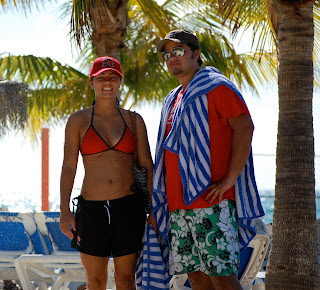I'm pretty certain that I met Dan when Dave and I were in Little Rock to begin our tandem transplant. Dave was fairly uncommunicative in those early days and I distinctly remember talking to a bright, handsome fellow sitting across from us. His wife Susan wasn't there as I recall, in the infusion center at the time. He was from Denver, he had had a transplant a couple of years before and now he was in LR. I remember that I liked him a lot and he was very upbeat and a great pleasure for me to chat with at the time. Anyway, I finally got caught up on "his story" last night and this morning. What a journey he and his family have been on! Its always amazing to me how different we all are and yet how much we are all the same. Dan has two beautiful daughters who were in college at the time and are now done and doing well. We have our two doing the same, with Hudson graduating this May and heading to Orlando to work his post graduate internship at Epcot.
So back to Dan, and his rock, Susan. He is currently at MD Anderson getting ready to undergo a mini allo transplant. The "mini" is the latest in the allo transplant, which is using stem cells from a donor, in this case one of his brothers. Leukemia patients typically get the allo as they have no cells of their own that can be collected. The allo has a much higher morbidity rate (30%) which is why it is a bit of a last ditch effort. But in Dan's case, his brother is a 100% match for him, and its the new "mini", and he's at MD Anderson, and he is an incredibly optimistic, strong person, with a tremendous support network. So this morning, I'm just feeling a strong yearning to write about Dan and give him all the spiritual support I can muster to get him through this new treatment he is embarking on and all the positive affirmations that he will do incredibly well.
Allos are the only true cure potential MM patients have at the moment. That's not to say that all the other treatment options we all battle with to make decisions about aren't promising and don't offer good outcomes. But the allo, when used, and if successful is by far the best opportunity to put MM firmly behind you. The mini is an effort to do the allo and mitigate the higher overall morbidity rates (from 30 to 10%). It has become a promising future path for those not able to get into a more stable disease presentation.
My thoughts and prayers to Dan and his wonderful family over these next weeks. I'm picturing him on the slopes, swimming, and riding his bike in beautiful Denver for years to come.
GO DAN!
Whatever "journey" you are on in life, you will meet people along the way that however brief the contact, who touch you, inspire you, make you laugh, give you hope, strengthen you... In the journey of Myeloma, which I am more familiar with, but I imagine it is true in other situations, you know that you are going to lose new friends along the way. You get attached and you grieve their loss, or you celebrate their triumph! Either way, was it worth it? I say, absolutely! You can't help but share their joys and their pains, as they do yours. That "look", of knowing its a good day or a rough day. The optimism of a good test result, or meeting with the doctor, the arrival of a loved one while you are far from home. Sharing the joys of someone being "sprung" and getting to go home! We all have a "story", and in them you see bits of your own and with that, there is understanding, hysterical laughter, tears, and most of all HOPE.
![Reblog this post [with Zemanta]](http://img.zemanta.com/reblog_e.png?x-id=775e8fa2-6866-4361-8759-d4de8df248ba)



![Reblog this post [with Zemanta]](http://img.zemanta.com/reblog_e.png?x-id=631fcc32-442a-43fd-bad6-00d22ea4582d)

![Reblog this post [with Zemanta]](http://img.zemanta.com/reblog_e.png?x-id=ffef6b1d-9618-4bc8-94d0-6d8a52bcf782)


![Reblog this post [with Zemanta]](http://img.zemanta.com/reblog_e.png?x-id=4939e806-a75b-4b23-b871-d82e87e183fb)
![Reblog this post [with Zemanta]](http://img.zemanta.com/reblog_e.png?x-id=2bc4d467-8b6e-4c5b-a3e4-2d78bd3b69f7)
